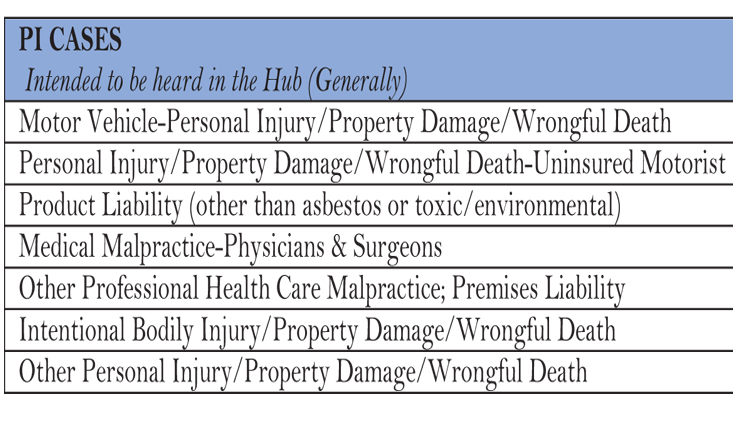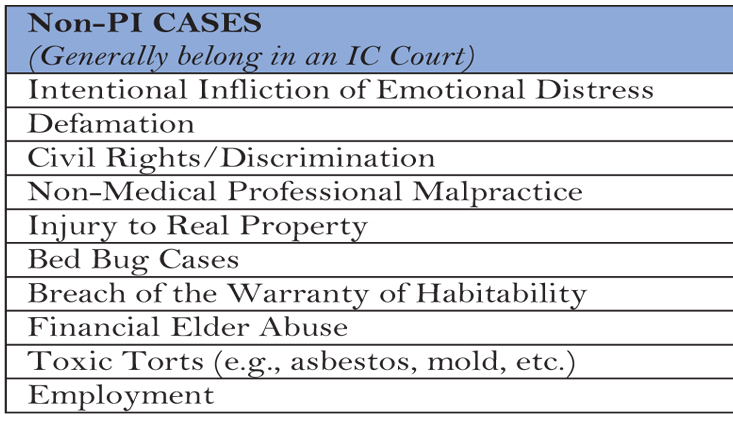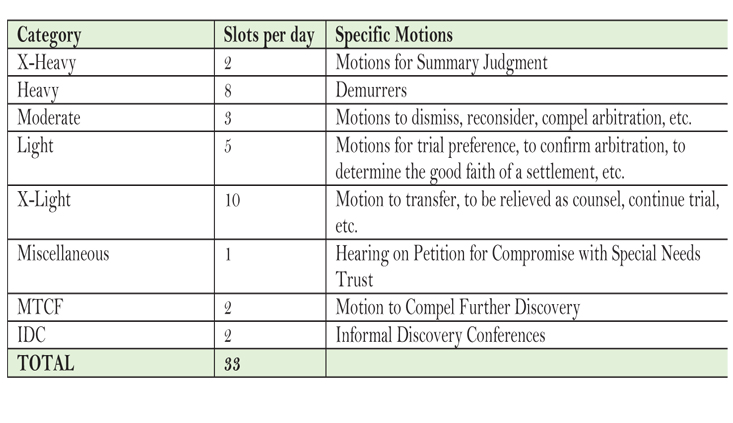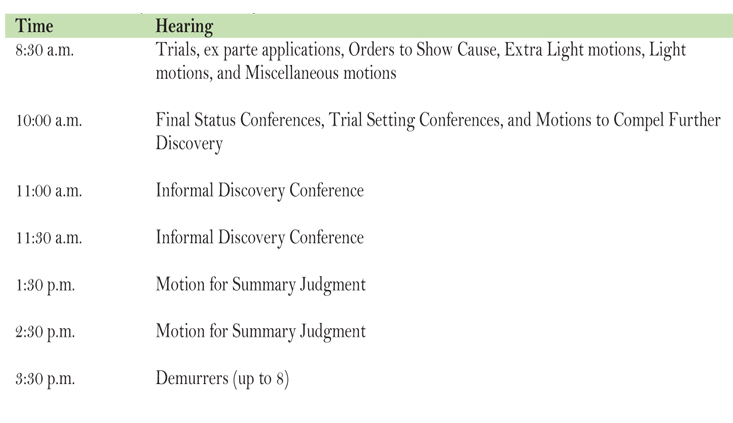Navigating PI cases in the Los Angeles Superior Court
Each of the five PI Hub courts have an inventory of over 9,000 cases
One of the primary missions of the Los Angeles Superior Court is to provide equal access to justice through the fair, timely, and efficient resolution of all cases. This includes civil litigation involving personal-injury claims. This article is designed to assist you in understanding how personal-injury cases are handled in the Los Angeles Superior Court and how to successfully navigate the system in the most efficient and expedient way possible.
What is a personal injury case?
If you file a personal injury (“PI”) case and correctly fill out the Civil Case Cover Sheet Addendum and Statement of Location (LACIV 109) when filing the Summons and Complaint, your case will be assigned to a court in the Personal Injury Hub, a collection of five courts in the Spring Street Courthouse which handle only PI cases.
The types of cases assigned to the PI Hub are prescribed by Los Angeles County Court Rules, rule 2.3 (a)(1)(A), rule 3.23, and the Los Angeles Superior Court’s February 24, 2020 Standing Order, as shown in the chart.
The types of cases in the second chart will not be assigned to the PI Hub.
If your complaint contains both PI and non-PI claims, and is assigned to a PI Hub Court, the PI judge will determine whether the case should be transferred to an Independent Calendar (IC) Court as a non-PI case. In making the determination, the PI judge will look at the crux of the claim, and specifically, the relief sought. For example, if the complaint alleges both personal injury and physical elder abuse claims, the PI Court will likely keep the case. On the other hand, if the complaint alleges financial elder abuse and related emotional distress, the PI Court will likely transfer the matter. Essentially, the PI courts will keep cases where the crux of the claim is personal injury and transfer those where the crux is not.
All transfer requests by a PI Hub judge must be approved by the Supervising Judge of Civil in Department 1 at the Stanley Mosk Courthouse.
How does the PI hub handle cases?
Pursuant to Local Rule 3.23 and California Rules of Court, rule 3.720(b), PI cases are exempted from the case management rules of the California Rules of Court, rules 3.720-3.734. Accordingly, PI Hub courts do not conduct Case Management Conferences. In fact, by design, PI cases receive little, if any, case management. Instead, upon the filing of a PI complaint, a trial date is automatically set approximately 18 months in the future and a final status conference is set approximately 14 days prior to the trial date. In most cases, the PI Hub Court will not be engaged in the matter again until the Final Status Conference, if even then.
Typical day in the PI Hub
The PI Hub courts’ calendars (see chart) are filled by the online Court Reservation System (CRS) using the following matrix to balance the workload throughout the day:
The PI Hub courts currently have seven daily time slots, (see chart)
(Note, however, that effective September 1, 2021, the PI Hub will rearrange these slots so that all motions will be heard at 1:30, as they were pre-COVID.)
Ex parte applications are heard at 8:30 a.m. each morning. No reservations are required, so please do not have your staff call to make one. Please note that under the PI Hub’s February 24, 2020 Standing Order, an inability to have a motion heard before a trial date is not considered an exigent circumstance, and an ex parte application made on that ground will be denied. The appropriate relief is to have your trial date continued to accommodate the motion hearing date rather than the other way around. (PI Hub 2/24/20 Standing Order, ¶ 16.)
Schedule your Law and Motion through CRS. Before the Court will hear a motion to compel further responses to discovery, the parties must have engaged in an Informal Discovery Conference (IDC). (PI Hub 2/24/20 Standing Order, ¶ 13.) IDCs are also scheduled through CRS. IDCs are very successful in eliminating unnecessary law and motion work. If opposing counsel will not agree to extend the time to bring a motion to compel further responses until after an IDC, set the hearing date on the motion far enough out so as to accommodate the first available IDC date.
What happens if your PI case turns out to require active case management?
It is important to understand that each of the five PI Hub courts have an inventory of over 9,000 cases. The PI Hub model was designed on the theory that PI courts can handle a large volume of cases with minimal case management, and that most cases will simply resolve on their own or go straight to trial. Nonetheless, some PI cases simply require more judicial attention than the PI Hub can provide and may be deemed “Complicated.” For the purposes of the PI Hub, “Complicated” simply means the case is inappropriate for the design of the PI Hub because it will require more active case management than the PI Hub courts have the capacity to offer.
A PI judge may not become aware that a case needs active case management until the case file gets reviewed in preparation for a hearing. The issue may also come to the Court’s attention pursuant to a party’s request to transfer the matter as complicated pursuant to the Court’s 2/24/20 Standing Order. (2/24/20 SO, ¶¶ 17-19.) In either case, if the PI judge determines that a case may need more case management than the PI Hub can provide, the PI judge will request Department 1 to transfer the matter to an IC Court. As with the determination of whether a matter is PI, the ultimate decision of whether a case needs to be transferred because it requires additional case management rests with Department 1. If Department 1 agrees with the request, Department 1 will assign the case to an IC Court.
Note, all Court-ordered dates will remain on calendar in the new IC courtroom pending that court’s receipt of the case. The IC Court will then elect either to keep the dates or to reschedule them.
Trial preparation
If your case remains in a PI Hub court, your trial preparation will be governed by the PI Hub’s Third Amended Standing Order dated February 24, 2020. This order sets forth the requirements for both the Final Status Conference (FSC) and trial readiness.
Final Status Conference
Approximately 14 days before trial, the parties appear for a Final Status Conference. Five days prior, the parties must file their FSC Notebook. Two days prior, the parties must e-mail the Notebook to the department in which the FSC is being held. At the FSC, the Court will fill out an FSC Form indicating that it has reviewed the Notebooks. The Form indicates that the Court has confirmed with the parties that they are ready to go to trial immediately and will remain ready to begin for the next five days (should they have to trail for a trial department).
An important aspect of the FSC is to develop an accurate estimated length of trial. The Court will confirm with the parties that the time estimates on the witness list are accurate. The Court will divide the total estimate by six (hours of trial/day) to determine the length of the evidence portion of the trial and will then add two to four days for motions in limine and jury selection. The sum is the trial estimate which Department 1 will use in selecting an available trial court to try your case.
At the FSC, if the Court determines the parties are ready to proceed to trial, the Court will have the parties return on the trial date. If the parties are wholly unprepared, the Court may continue the FSC and trial to future dates and may set a hearing on an order to show cause why the parties should not be sanctioned for failing to comply with the Third Amended Standing Order. At the FSC, the Court will inquire as to whether the parties have engaged in a mediation or Mandatory Settlement Conference within the previous 90 days. If they have not, the Court will contact Department 1 for an assignment to a Civil Trial Judge for a Mandatory Settlement Conference. The trial date will likely be continued to accommodate the MSC.
Bench Trial Pilot Program
On May 3, 2021, the Los Angeles Superior Court launched a PI Bench Trial Pilot Program. The six-month pilot program runs through November 1, 2021. This new voluntary pilot program allows litigants of cases assigned in the PI Hub to obtain a bench trial date with a Civil Trial Court department within 60 days if the parties stipulate to waive the right to a jury trial and will be ready for trial within 60 days. The parties retain their right under Code of Civil Procedure section 170.6. This new fast-track personal injury pilot program is designed to provide continued access to justice and assist in resolving COVID-19 pandemic- related delays. Please refer to the Los Angeles Superior Court website for more information.
Trial
If on the trial date both sides answer ready, the PI Hub court will call Department 1, which makes a trial court assignment. Each counsel will then have 20 minutes within which to exercise a peremptory challenge pursuant to Code Civil Procedure section 170.6. If no challenge is made, counsel will be ordered to appear in the assigned civil trial court.
What to expect when your case is transferred to an Independent Calendar court
If your PI case is deemed complicated, you will receive a notice from Department 1 that it has been transferred from your PI court and reassigned to a specific IC court. It is important to carefully read this minute order.
The first thing that you should do is check to see if your new IC judge and department have an online “Courtroom Information” page on the Los Angeles Superior Court website. Many of the judges post their courtroom rules and policies. You get off on the right foot being familiar with the judge’s preferences and requirements. For example, the judge may require IDCs or request courtesy copies of law and motion briefing.
Do not assume that the motions calendared in your PI court will be automatically calendared in the new IC department for the same date and time. You should immediately contact the IC court department clerk about how the motions will be placed back on calendar if the dates have been vacated.
The average pending case inventory for IC courts is high. In the Central District, the average docket is 700 cases and petitions, compared to 473 in January 2015. Furthermore, the IC courts handle a wide variety of subject areas in addition to personal injury, including employment, real property, contract, defamation, and lemon law.
The Case Management Conference
Most judges will start by scheduling an initial Case Management Conference (“CMC”). If an initial CMC is scheduled, you must file and serve a CMC Statement no later than 15 calendar days before the hearing date, and fill it out correctly and completely. (See California Rules of Court, rule 3.725 and Local Rule 3.25(b)(2).)
Remember, you are required to meet and confer with opposing counsel on all the issues and subjects covered in the CMC Statement, as required by California Rules of Court, rule 3.724 and Local Rule 3.25(b)(1). Many lawyers do not comply with this requirement. You should have more than just cursory discussions about the CMC Statement topics. Instead, take advantage of this opportunity to have a truly informative exchange with opposing counsel before the CMC Statements are filed. For example, discuss whether the parties are willing to attend an early private mediation sooner or after some discovery has been completed. Or, as an alternative, discuss whether the parties prefer a Mandatory Settlement Conference with the Los Angeles Superior Court’s Judicial Mandatory Settlement Conference (“MSC”) Program. These discussions about the case will be extremely helpful in identifying issues that need to be raised with the judge at the CMC hearing.
Things you must include in the CMC Statement:
Have all parties been served?
Have all parties appeared?
Will additional parties possibly be added?
Should the CMC be continued?
Is it possible that bankruptcy of a party may be an issue?
Is your client seeking a jury trial or court trial?
What is the status of discovery or planned discovery?
What motions are anticipated?
Other things to include in the CMC Statement are:
Are there are insurance issues that the IC judge should be aware of? For example, is an insurance company involved because an insurance claim has been filed or the Defendant tendered the defense?
Is there a related case? If so, a Notice of Related case must be filed in both cases. (See California Rules of Court, rule 3.300.) The judge handling the case with the earliest filing date will make the decision about relating the cases or not.
Have a discovery plan, including when you will commence discovery and when you anticipate your discovery will be completed. Leaving that section blank on the CMC Statement, or merely inserting “per code,” is not proper or helpful (expert discovery is an exception). It does not give the judge any sense of timing with respect to your case preparation.
Be prepared to discuss when you will be ready for trial. As mentioned above, on May 3, 2021, the Los Angeles Superior Court launched a PI Bench Trial Pilot Program running through November 1, 2021. This new voluntary pilot program allows litigants of personal injury cases to obtain a bench trial date with a Civil Trial Court department faster (within 60 days) if the parties stipulate to waive the right to a jury trial. Let your IC judge know if the parties want to volunteer for this pilot program. In addition, if the parties are willing to stipulate to waive the right to a jury trial, most IC court judges will give you an earlier court trial date if you are staying in their department for trial, which can all be discussed at the CMC or trial setting conference.
The attorney who attends the CMC must be familiar with the case status and the contents of the CMC Statement to have an informative discussion with the Court, including issues raised by the opposing counsel, and answer any questions from the judge. (California Rules of Court, rule 3.722(c).) You do not make a good impression on behalf of your client and your firm by sending an attorney who does not know anything about the case and is unable to answer questions posed by the judge.
If you believe that the case requires an additional Case Management Conference or a status conference or two because of complex issues, or for some other reason, request it.
Law and motion
Hearings for law and motion matters are scheduled on the CRS. Each IC department programs its own CRS schedule for motions that will be heard on a daily basis. Find out if your judge requests that the parties provide courtesy copies of motion briefing.
Plan ahead if you think you will be filing a dispositive motion, such as a motion for summary judgment. It is recommended that you reserve a hearing date as soon as possible. This is a good practice so as to ensure that your motion can be heard before trial. Otherwise, the trial may need to be continued if the IC department’s docket becomes too congested, there are no hearing dates available on the CRS, and the Court is unable to give you a hearing date before trial.
Discovery
Many IC Court judges are now requiring that an Informal Discovery Conference be completed before a discovery motion will be heard. But, before you request an IDC, truly engage in good faith discussions by telephone or video conference. Again, do not simply send emails or letters back and forth with threats of a motion without having substantive discussions.
If you are thinking of entering into an agreement to “stay” discovery with opposing counsel while you try to settle the case or for another reason, remember that it does not automatically translate into an official stay of the case unless the Court enters a formal order. Therefore, you should discuss the implications with your judge first. (See Local Rule 3.25(c).)
Trial readiness and the Final Status Conference
Trial dates are firm. Do not assume that a request to continue trial, even if stipulated, will be granted. So, plan and prepare early.
In light of the recent requirement by Department 1 that a private mediation or MSC must be completed within 90 days of the trial date before a case may proceed to a jury trial, make sure you plan ahead to comply. Otherwise, the trial date will be continued.
It is also important that you are aware of the pre-trial readiness requirements of your IC Court judge if they are keeping the case for trial. Many will require that you follow the applicable Final Status Conference Standing Orders regarding Personal Injury Cases (PI Hub’s Third Amended Standing Order dated February 24, 2020). In addition, inquire in advance regarding when motions in limine will be heard and ruled upon; some judges wait until the first day of trial, others prefer the Final Status Conference.
As part of trial preparation and drafting of a joint witness list, be ready to inform the judge about the estimated number of days for trial. Advise the judge if an interpreter is needed, what language, and be sure to factor the additional time for interpretation of testimony into your estimated number of days for trial.
Do not assume that you will automatically go to a Long Cause Department for trial if it is going to exceed 20 days. Refer to the “Long Cause Trial Package Guidelines” posted on the Los Angeles Superior Court’s website and discuss the subject with your judge.
Day of trial
In an IC Court, the judge has the choice of keeping your case for trial or sending it to a Civil Trial Court. Again, you should plan to follow the applicable Final Status Conference Standing Orders regarding Personal Injury Cases, unless your IC judge tells you they have different requirements that you should follow. If the IC Court judge is sending the case to a Civil Trial Court, the judge will confirm that all parties are answering ready to proceed to trial and all required trial readiness documents are complete. The case will thereafter be sent to Department 1 for a Civil Trial Court assignment. Please keep in mind that the Civil Trial Court may be in any one of the trial court departments located in the various court districts, including the Pomona Courthouse, Santa Monica Courthouse, Van Nuys Courthouse or Spring Street Courthouse. Read the transfer minute order carefully, as different districts may not have the same procedures.
Tips for both the PI and IC courts
The following tips will serve you well in both the PI Hub and IC Courts:
Keep abreast of information and recent announcements on the Los Angeles Superior Court website, including Court News Releases and Notices to Attorneys.
Always be prepared for your hearing.
It is important that you check your case citations in law and motion briefing. There is nothing worse than a judge trying to pull up a case you have cited and finding that the citation is incorrect.
Be proactive. A good percentage of law and motion is unnecessary and is simply a matter of counsel not communicating with each other. Do not simply write meet and confer letters. Call opposing counsel and try to work out informally the issue at hand. For example, why did you receive only objections to the discovery you sent? Are the requests truly objectionable, or is opposing counsel under water with work or unable to connect with their client? If so, work something out. Be creative. Remember that you are an Officer of the Court, and that your role is to resolve the problems between your client and the opposing side. How can you and opposing counsel work together to make that happen as quickly and as efficiently as possible?
In ex parte applications, start by informing the court of the relief you request and why you are entitled to it right up front. Keep in mind that the court has limited time to review these applications.
Talk to your IC judge about when they will make a decision about keeping a PI case for trial and what factors will affect their decision. It often may depend upon other non-PI trials scheduled in that IC court department, whether your trial is a bench trial or jury trial, and the estimated number of days your trial will require.
Remember that the purpose of motions in limine is to preclude evidence or testimony.
Talk to your opposing counsel about any facts that can be stipulated to for purposes of trial. For example, the date and location of the incident. Consider submitting a statement of stipulated facts that can be read to the jury by the judge and provided to them in the jury room. This can save time that you can devote instead to issues that are disputed.
If you are unable to get an IDC hearing date on CRS as soon as you would like, reserve the first available date, and check back to see if an earlier date possibly opens up. Cancellations often occur, and you can move up your hearing on CRS.
Ask your judge whether they require that both sides must agree to participate in an IDC, or if an IDC can be reserved when only one side is willing.
And last and most important, please be polite and courteous to the court staff on the telephone and in person. They are willing and to able help you.
Stephanie Bowick

Hon. Stephanie Bowick was appointed to the Los Angeles Superior Court by Governor Arnold Schwarzenegger in July 2009. She currently sits in Department 19 of the Stanley Mosk Courthouse, an Unlimited Civil Court (Independent Calendar). Prior to her appointment to the bench, Judge Bowick practiced civil litigation in both federal and state courts, including serving as a Senior Trial Counsel for the City and County of San Francisco and as an Associate with the complex class action law firm of Barrack, Rodos & Bacine.
Daniel M. Crowley

Hon. Daniel M. Crowley was appointed by Governor Jerry Brown in 2018. He sits in Dept. 28 of the Los Angeles Superior Court, which is one of the Court’s Personal Injury Hub courts. Prior to his appointment, he was a trial attorney with Booth, Mitchel & Strange, LLP, where he was Managing Partner.
Copyright ©
2025
by the author.
For reprint permission, contact the publisher: Advocate Magazine




